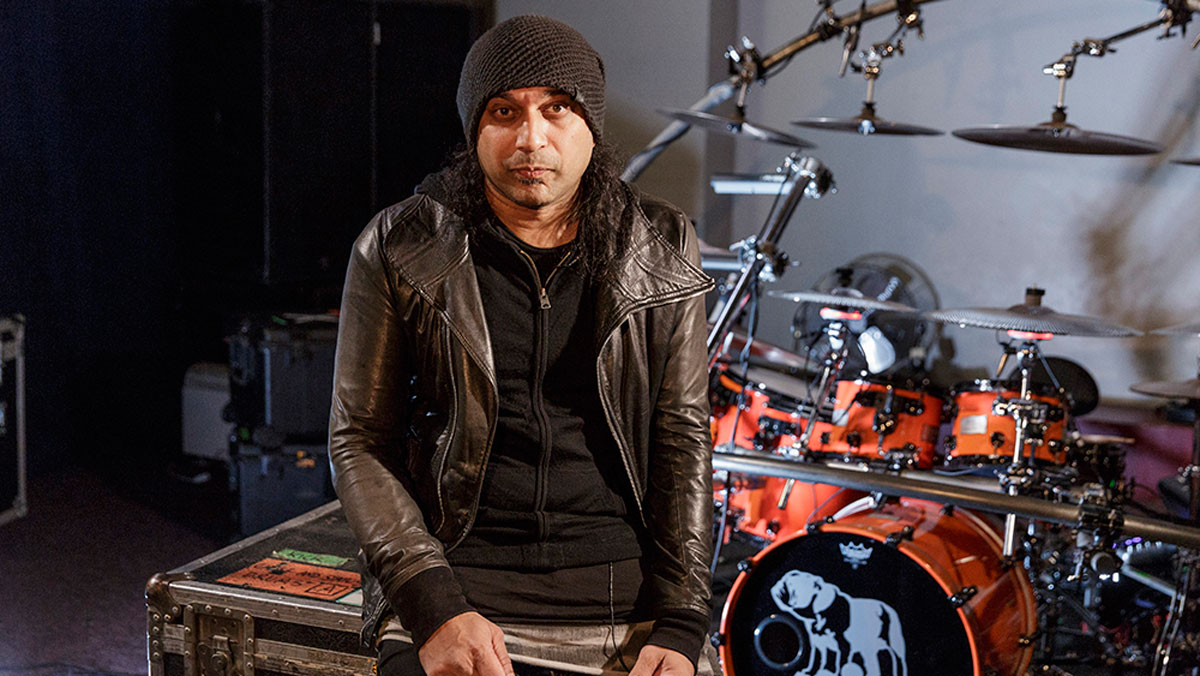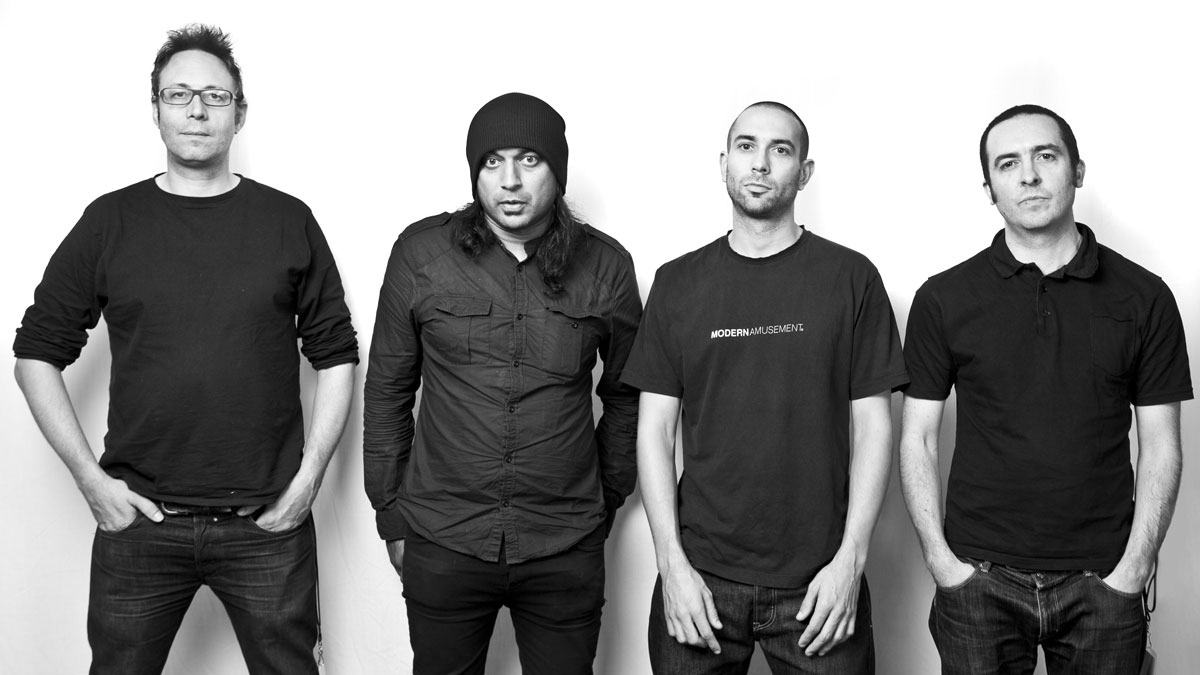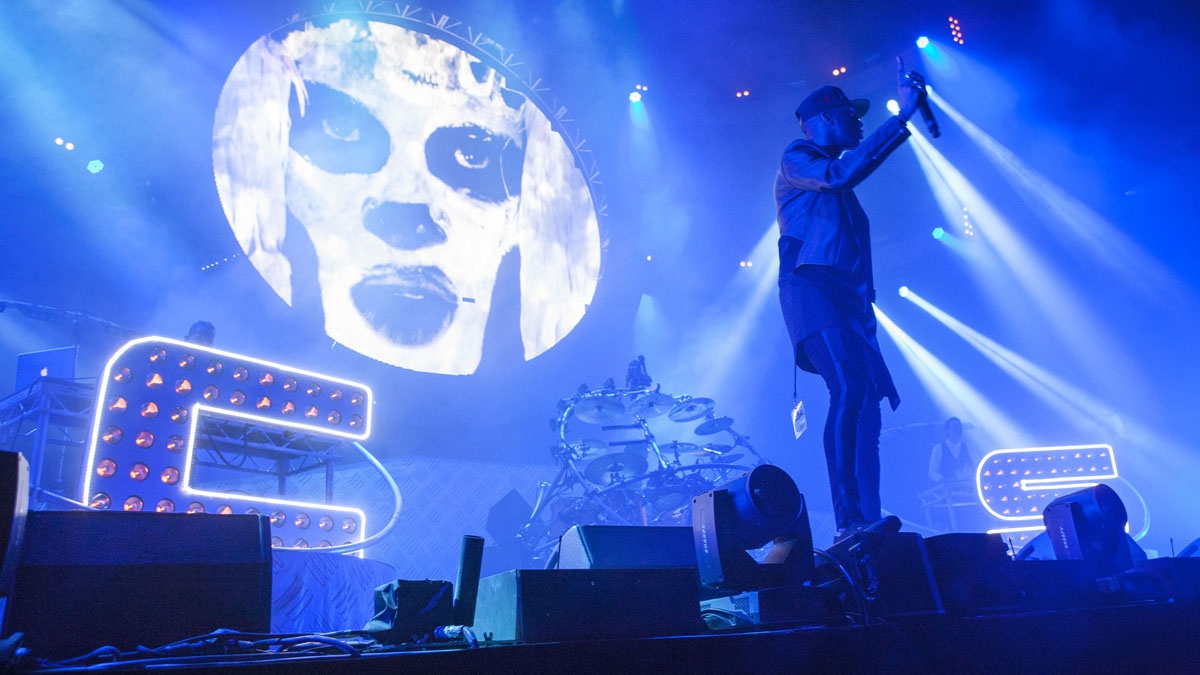Andy Gangadeen talks his early days, hybrid drumming and mega pop gigs
The drum’n’bass drumming wizard talks pioneering hybrid, living his dreams and moving on from the Spice Girls

Touring America was amazing. I landed at LAX and thought, ‘This is amazing!’
Today it may be commonplace to see a bank of electronics, pads and triggers alongside the kit of any touring drummer. But step back to the late ‘80s and, more often than not, it was a case of drums + electronics = sounds resembling the EastEnders theme tune. But that didn’t stop Andy Gangadeen.
Through a slew of top pop gigs, Gangadeen - aided by his background in electronics - blazed a trail for what we know today as hybrid drumming. Using an almighty amount of what today looks like ridiculously primitive gear, he was able to replicate album sounds and tones live on stage.
That may be a given for just about all pop shows in 2017, but as we say, back then it was neither commonplace nor easy to achieve.
After a stint with a then at-the-peak-of-their-powers Spice Girls, Gangadeen launched his own project, The Bays and work with even more heavyweight names, such as Jeff Beck. In recent years, he has been the percussive force behind drum’n’bass sensations Chase & Status.
He has also become something of a mentor figure for many upcoming hybrid drummers, for proof just check out our recent feature with Rudimental’s Beanie and Anne-Marie sticksman Oli Wiseman.
Ahead of his Masterclass and Main Stage performances at this year’s London Drum Show, we chatted with Andy all about his pioneering work with electronics, his time touring stadiums around the globe with the Spice Girls and a whole lot more.
You were a relatively late starter on drums. What led you to picking up the sticks at 17 years old?
“I studied with Bob Armstrong who sadly passed away recently. I went to his funeral and bumped into a guy who I had never met before who said he had seen me play with The Bays and it turned his head and he had to find out who I was and who my teacher was.
"From that moment on he went on to Bob and took lessons. For me, I saw Guy Richman when I was 17 and I watched him play in a big band and he sounded amazing and I had to find out who his teacher was. I found out it was Bob Armstrong.
"Sometimes in life things just hit you and you realise it is exactly what you want to do. I studied with Bob for five years and then went on to playing with Basia and in 86 and 87 I toured America. Then I played with Lisa Stansfield in 1990 and it snowballed from there.”
Bob was a fantastic educator. But what was it about his teaching style that worked so well with you?
“He was fantastic. Bob was a disciplinarian. The first thing he said to me was that there was no magic in it, it was all hard work and practise.
"I went to Bob under the delusion that I would be his best student, obviously it didn’t turn out that way! At the height of being with him I was practising for eight hours a day.
"Out of the five years I went to him there was two-and-a-half years of intense learning. He was all about hard work. If you turned up and you hadn’t done your homework he would send you home. There was nothing zen about it, he drilled you.
"I’ve spoken to some of his other students about this term ‘Bob fear’ which was that he would give you this look if you hadn’t done what you were supposed to do. I think you need that in a teacher-pupil relationship.
"He put the fear of god into you but he was also one of the funniest people I ever met. He instilled a really strong work ethic in me.”
I had two Akai S900s which were these three unit racks which could hold a maximum of 20 drum sounds on each one. It was all floppy disks then and the tech would have to load in the next set of sounds while I was playing. The rack was about the size a really big fridge!
You were touring the world at 24 - was that a shock to the system and a major learning curve?
“It was. I took to it like a duck to water though. It was a dream come true. Touring America was amazing. I landed at LAX and thought, ‘This is amazing!’
"I played on the Johnny Carson Show, but I didn’t take it for granted. I was still working hard and practising while we were on the road. I was still buying books and learning.
"I was a new kid on the block and I wanted to maintain the enthusiasm that I had.”
Were you always interested in the electronics element to drumming, or did that come later on?
“I wanted to play drums since I was seven but my dad didn’t want me to have a career in music so I studied electronics at college, so I had always been interested in electronics.
"I went to see Chick Corea with Dave Weckl playing at Ronnie Scott’s. Dave Weckl had a whole rack of electronics. The sound just blew my head off. I was blown away. I thought I had to emulate that sound.
"For me, it’s not just how you play or what you play, it’s also how it sounds. If you what you play sounds amazing then you can play less. That sound gives it an energy. I latched onto that early on. For me, the way things sound is as important as the way things are played.”
Did you encounter an uphill battle in those early days of electronics?
“Oh yeah, you can’t imagine it now. When I did a Lisa Stansfield tour I had two Akai S900s which were these three unit racks which could hold a maximum of 20 drum sounds on each one.
"It was all floppy disks then and the tech would have to load in the next set of sounds while I was playing. The rack was about the size a really big fridge!
"I can do all of that now on a TM-2 that fits in the palm of my hand. Back then it was unheard of, why would someone want to trigger the sounds from a record to play them live?”
Have you noticed a big change in attitude from drummers and non-drummers about using electronics?
“I think people buying kits to practise on has been a game-changer, these people buying electronic kits for their bedrooms. That has got people into electronics.
"This new generation wouldn’t bat an eyelid at playing a mesh-headed kit. Attitudes have changed, for the better.
"Acoustic kits will always have their place, I like drums and cymbals to sound natural but then have the electronics in addition to the acoustic. That’s why I don’t put triggers on my acoustic kit.
"I approach the two very differently. The technique to play an acoustic kit is totally different to what it is to play electronic. Hybrid is a thing I’ve been bashing on about for years and now kids are getting to understand the relevance of it and how important it is.
"It can open out your playing and your potential for a career in drumming. The days of just turning up with a five-piece kit are gone, today you’re expected to do so much more as a drummer and a musician.
"The more knowledge you have the further up the ladder you will get. It makes you more employable."

From Spice Girls to The Bays...via Jeff Beck
Coming back to your career path, how did the Spice Girls gig come about for you?
“I had been playing with Massive Attack when I got the call for the Spice Girls. I had the choice of staying with Massive Attack, who I totally admire and had been privileged to be involved with them, or go off and do this mad Spice Girls thing.
"At the time, the Spice Girls were the biggest thing going. I thought I could go do it for 18 months and bank enough money to do what I wanted to do. I took the Spice Girls option [laughs]. That was an interesting time.”
It must have been an interesting gig to be on…
“It was character building. At the time I absolutely hated doing it. Then, about three years ago a friend my mine forced me to watch the movie Spice World, which I was in. I watched it and said, ‘God, that looked like loads of fun.’
"I realised in my head that it wasn’t that bad. It was one of those that at the time when you’re doing it you think it’s worse than it is. We did some massive shows like Madison Square Garden.
"The people that would show up as well was incredible. We had Prince there, Madonna, it was so big. They were the biggest band in America at that time. I look back on it now with a great amount of fondness. It was a good thing to have done, but I do hope I have moved on from it!”
Was it difficult to play a gig that you just didn’t enjoy?
“Yeah. The only way I could get around it was that I took a massive mobile recording studio out on the road with me. My tech would get to the venue and set it up and I would stay at the venue all day and work on music, do the soundcheck, do some more stuff and then we’d move onto the next city and I’d do the same thing again.
"That was my way of escaping and focusing on some production work and honing in on ideas for writing. I wasn’t moping in my hotel room, I used the time wisely at least.”
At the time I absolutely hated doing [the Spice Girls gig]. Then, about three years ago a friend my mine forced me to watch the movie Spice World, which I was in. I watched it and said, ‘God, that looked like loads of fun.’
You later worked with Jeff Beck - that’s quite a leap from the Spice Girls
“Tell me about it! That was one of those things, I got the call and he had been working on this album called You Had It Coming and it had lots of electronics on it. I went down for an audition and got the gig. I thought I couldn’t say no to that gig.
"But then it was a double-edged sword because then I had to play some of his old stuff which was way beyond my capacity, really. I was over-stretched. I guess looking back on it I wouldn’t have ran ahead to take that gig. But he was amazing.
"To work with someone that good does make you raise your game, you have to dig keep and try to keep up with this monster on guitar. It was a learning experience. I would go in a bit more prepared if I got asked to that gig again.”
Was it around that point that you launched your own band, The Bays?
“I thought after the Spice Girls that would be it for me with session playing. I could then manage to bankroll my existence for nine or ten years, but that money soon runs out when you’re running your own band.
"That was definitely the case with doing The Bays. But that band was really representative of what I wanted to do. After that I got the call to do the Chase & Status gig.”

The drum'n'bass years
You mentioned Chase & Status, was that a partnership that just worked between you?
“It did, yeah. I’ve got a huge amount of respect for those guys. They got the offer to do the Radio One Big Weekend in 2009. They had never done anything live before.
"They asked me if I would do it and as it was two weeks away they said just for this gig they would all mime and then we’d get into rehearsals to play live.
"I said I wouldn’t do that. I said we would rehearse for a week playing live and if it didn’t sound right after a week I would mime but if it did sound right I would play live. I held my ground and we played live. It paid off.
"I had never seen a crowd moshing to drum’n’bass before, it was a revelation. I came off stage thinking I had never seen a reaction like that before. I knew we were onto something.
"We then did a six week club tour doing five or six nights a week back-to-back. We defined the live thing within those six weeks and that was it. They’re real scientists. It’s this sonic onslaught with the drums to match. It’s a real wall of sound.”
How has the role of the drummer changed during the span of your career?
“If I was to answer that in a matter of fact way, my stubborn answer would be that hopefully it hasn’t changed at all.
"The role of the drummer has always been to be supportive. You’re not there to stand out. You’re there in a supportive role. The drums have always been the backbone and that needs to come across.
"There’s this new way of thinking where there’s way too much playing and too many fills; that has nothing to do with the music. It’s killing me to see that, there’s nothing better than seeing someone locking it down in a way that grooves and works with the music.
"That’s when drums do stand out and it’s not because you’re intentionally trying to draw attention, it’s that you’re just doing your job well. But, if I looked at that question in a different way, yes the drummer’s role now has to be more involved with technology and being able to adapt to more than just a straight acoustic sound.
"In essence though, you’re still hitting things in a certain order with a certain degree of timing to make whoever you’re playing for sound great. I don’t think that will ever change and I don’t think that ever should change.”
I had never seen a crowd moshing to drum’n’bass before, it was a revelation. I came off stage thinking I had never seen a reaction like that before
What’s the biggest piece of advice you could offer to someone starting out as a drummer today?
“I would say to work hard, practise loads and listen to as much music as you can. You need to check out as much stuff as possible. There is always one thing in a genre that will feed into what you’re doing.
"Just keep listening and get out and see as many different types of drummer as you can. There is always something you can take from each one. Even if you watch someone and don’t like anything that they do then it will show you what not to do.
"Sometimes it’s a process of elimination and you have to think that you can see someone is good but you never want to sound like them. Just from watching other drummers you can hone down what you have in your head in terms of what you’re hoping to do.”
Rich is a teacher, one time Rhythm staff writer and experienced freelance journalist who has interviewed countless revered musicians, engineers, producers and stars for the our world-leading music making portfolio, including such titles as Rhythm, Total Guitar, Guitarist, Guitar World, and MusicRadar. His victims include such luminaries as Ice T, Mark Guilani and Jamie Oliver (the drumming one).
